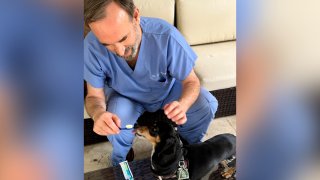
Just like their human companions, pets need routine dental care. In fact, roughly 80% of dogs and 70% of cats have some degree of periodontal disease by the time they are two years old.
If you’re one of the 23 million American households who acquired a pet during COVID lockdowns, now is the time to establish a plan to keep those young choppers healthy.
Watch NBC6 free wherever you are
>Periodontal disease leads to heart failure, kidney disease, and liver failure; it’s even been linked to diabetes. To help ensure our pets stay with us for many years, it’s important to understand the role of a healthy mouth.
Last month, we discussed the importance of an annual dental cleaning at a veterinary facility that included anesthesia and x-rays. But there are many fun, easy home dental care routines that can help maintain your pet’s periodontal health between procedures. Let’s start with the gold standard.
Get local news you need to know to start your day with NBC 6's News Headlines newsletter.
>Brushing Your Pet’s Teeth
Many of us, myself included, did not grow up in a world where brushing a pet’s teeth was a thing. However, we now know daily brushing is a great way to slow the accumulation of plaque and tartar. Pet toothbrushes are sold online and in pet stores, but any soft-bristled toothbrush that fits inside your pet’s mouth will suffice. Child-sized toothbrushes are perfectly sized for our miniature dachshund. Pets who will not tolerate a toothbrush often accept a finger brush. While cats can be challenging, even small pet toothbrushes are not designed with a cat’s unique dentition in mind. Cat parents see much better results when they use products specifically developed for cats.
When it comes to toothpaste, never use a product intended for humans. Since our pets cannot spit, it’s important to choose toothpaste that is meant to be ingested. Additionally, pet toothpaste is often flavored with, beef, chicken, tuna and other flavors pets find palatable. Look for enzymatic toothpastes; these products contain enzymes that help reduce bacteria. This in turn lessens tartar buildup and can improve bad breath.
Local
Dental Wipes
While brushing is ideal, many pets simply will not allow their humans to do it. These same pets, however, are often receptive to dental wipes. These single-use, disposable wipes do a fine job of removing everyday gunk. They are less messy than toothpaste and easy to store. While the friction associated with brushing has proven to be more effective, I personally find the level of compliance is much higher with wipes. Perhaps this is why I find pets whose parents use wipes enjoy about the same degree of oral health than those whose parents brush. Regardless of whether you brush or wipe, make sure to reach deep into your pet’s mouth to clean the back teeth.
Water Additives
Pets who will not cooperate with brushing or wiping regimens may benefit from a water additive. These products contain ingredients that can freshen breath and control the growth of plaque-forming bacteria. Water additives tend to be well tolerated by cats. Be sure to change water as directed, and discontinue use if your pet refuses to drink the treated water.
Prescription Diets
Prescription dental diets are made of uniquely shaped kibble that helps clean the surfaces of teeth as your pet chews. They contain ingredients designed to fight plaque and tartar buildup as well as reduce bad breath. These diets must be prescribed by your veterinarian.
Dental Treats
Pet retailers boast a dizzying variety of products claiming to promote the oral health of our furry family members. Look for products bearing a seal of acceptance from the Veterinary Oral Health Council or VOHC. The Council is a body of veterinary dentists and dental scientists that reviews submissions and recommends products to carry the VOHC seal of acceptance. VOHC accepted products have been shown to reduce tartar and/or plaque. The Council currently boasts extensive lists of accepted products for both dogs and cats. While approved treats and chews are valuable tools in the fight against periodontal disease, it’s important to remember that many treats are calorically dense and should not be given excessively. For pets who tend to gulp rather than chew, dental treats can present a safety concern. Always check with your veterinarian before offering a new dental care product.
Chew Toys
While chewing is a behavior that can naturally promote good oral health, some chew toys can damage a pet’s teeth. Toys designed for powerful chewers are often made of materials that can fracture teeth, wear enamel and destroy vital pulp. Many stories of pricey dental surgeries begin with antlers. Dogs love them. Veterinary dentists hate them. The same can be said for hooves, most bones, and toys made of hard plastic or rubber. Safe chew toys should be flexible and easy to bend. A good rule of thumb (no pun intended) is to press your fingernail into the toy. If your nail leaves an indentation, it is soft enough for your pet’s teeth. Discard chew toys that have been reduced to pieces small enough to be swallowed. Steer clear of rope toys and tennis balls as fabric can accumulate under the gum line causing inflammation and infection.
Remember, home dental care is not a substitute for regular, professional cleanings and x-rays by your vet. Many hospitals offer periodic discounts or coupons for these services - because we all want fresh, clean kisses from our furry family members!
Dr. Kupkee is Medical Director at Sabal Chase Animal Clinic.



